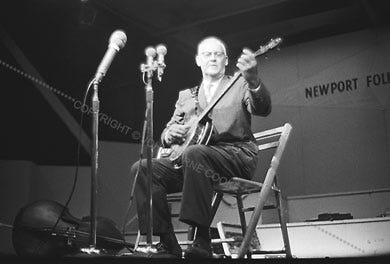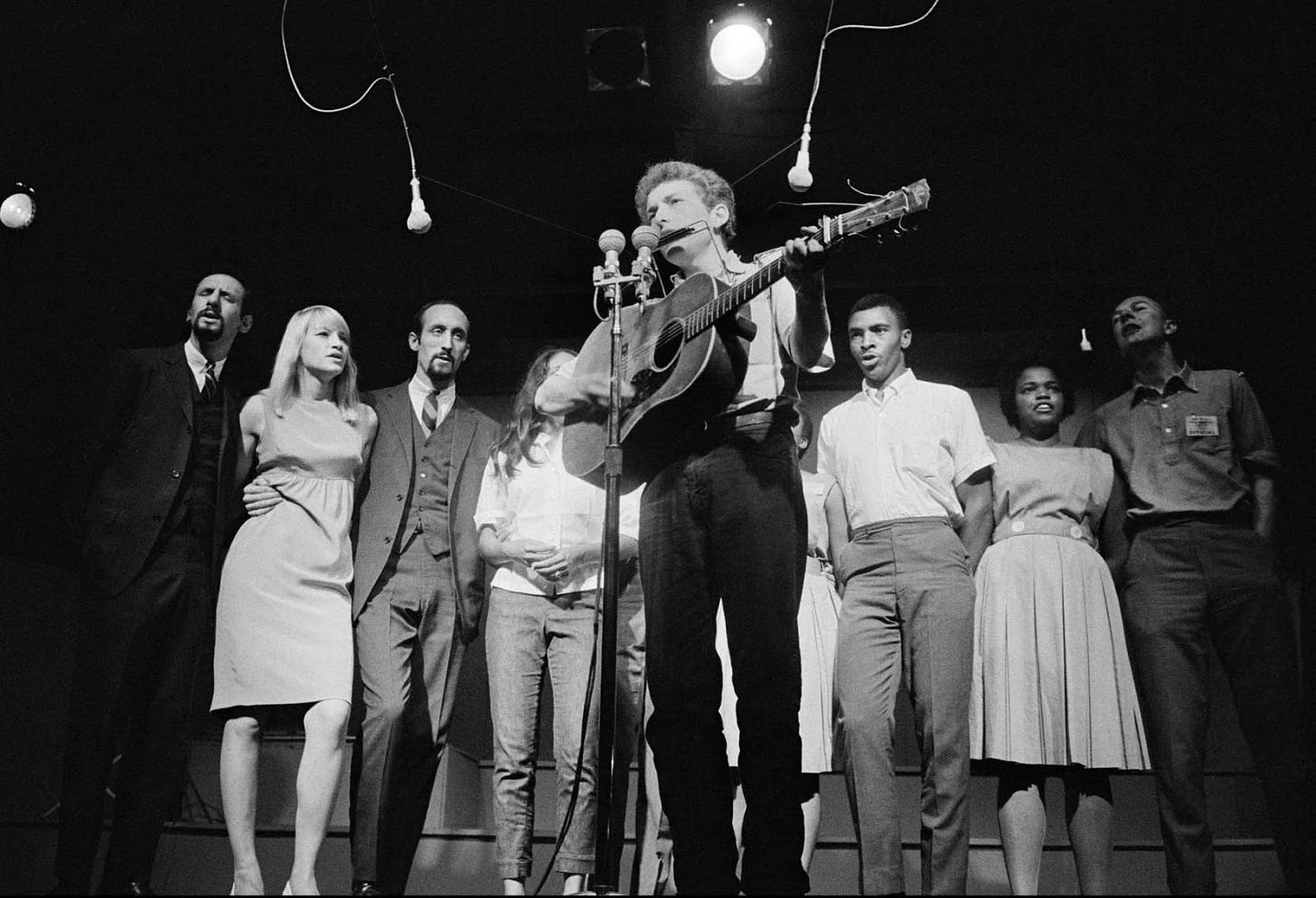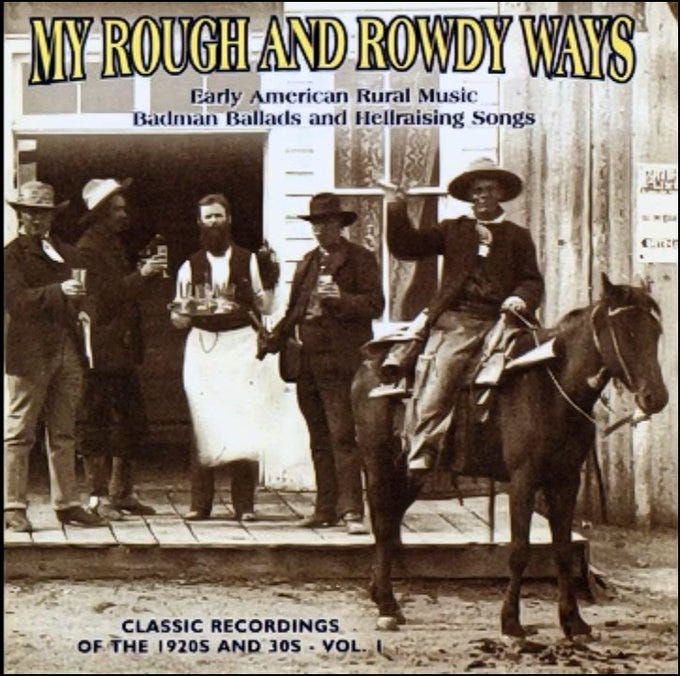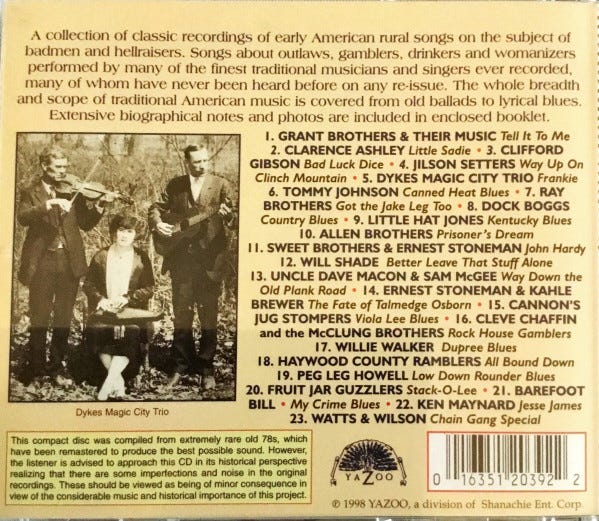Connections Between Bob Dylan and Dock Boggs
A few quick notes
A few quick notes on the connections between Dock Boggs and Bob Dylan (and Bukka White), following this post on Bob Dylan’s Intagram page,
There seems to be a few interesting connections between Bob Dylan and Dock Boggs. From what I have been reading, I am wondering if it was in 1963 that he met him. Also, a link between Dock Boggs and Bukka White (A video of Bukka White playing Jelly Roll Blues was recently posted on Bob Dylan’s Instagram page, with no caption or description), is that they were both rediscovered in the early 1960's. Dock had been a coal miner for years. He was retired coal miner when rediscovered:
Dock Boggs playing the song Pretty Polly in 1966. Shot by Alan Lomax and crew at the Protective Club, 596 Thames St., in Newport, Rhode Island, during the 1966 Newport Folk Festival. (Also he tells the story of being a retired coal miner .. rediscovered).
.. Bob played Pretty Polly at the Gaslight Café. 6th September, 1961. The first known recording of him playing there.
"Pretty Polly", "The Gosport Tragedy" or "The Cruel Ship's Carpenter" is a traditional English-language folk song.
In the United States, the song had gained new life as a banjo tune by the time of its earliest recordings in the mid-1920s: John Hammond's "Purty Polly" of 1925 and 1927, and the "Pretty Polly" versions of B. F. Shelton and Dock Boggs, both of 1927. "
https://secondhandsongs.com/work/28916/all
Bob Dylan played Bukka White's song Fixin' To Die at his first big concert in New York City, Carnegie Hall.
.. Also, on Pretty Polly, "The ballad is the musical basis for "Ballad of Hollis Brown" by Bob Dylan who played "Pretty Polly" himself in his early years. "
Another link to a song on The Times They Are A-Changin', 1963.. Is the song, North Country Blues,
The Instagram post by Bob Dylan had on it the song Country Blues, which was written by Dock Boggs, according to this page,
https://secondhandsongs.com/work/129691/all
.. Recorded by him in 1927. “From Dock Boggs recording of ‘Country Blues” on Brunswick 131 in 1927 with “Sammie, Where Have You Been So Long?” on the other side;”
“CATEGORY: Fiddle and Instrumental Tunes DATE: Late 1800’s;”
http://bluegrassmessengers.com/country-blues--version-1-doc-boggs--1927.aspx
.. Reading further, Dock was the first to record this song in 1927, and he added some of his own verses. He recorded this song again in 1963 and added some more verses.
“NOTES: A Mixolydian, one part; “Country Blues/Hustling Gamblers” is part of a family of “white blues” songs that include “Darlin’ Corey” and “Little Maggie,”and “East Virginia Blues” which were found in the Appalachian region in the late 1800’s.
Dock Boggs recording of "Country Blues” was issued as Brunswick 131 in 1927 with “Sammie, Where Have You Been So Long?” on the other side. Homer Crawford, the itinerant photographer and musician from Tennessee, taught the song to Dock as Hustling Gamblers, probably around 1914. Dock added verses of his own both for this recording and later, in 1963, when he recorded it again on Folkways FA 2351. Hustling Gamblers and Darling Cory (or Corey) belong to the same lyric and tune family, one that has been around in the Southern mountains for over a century. The family of tunes probably originates late in the 19th century and belongs to the then developing tradition of white blues ballads. Dock's tune differs from the common versions.”
Come all you good time people
While I have money to spend
Tomorrow might be Monday
And I neither have a dollar nor a friend
When I had plenty of money, good people
My friends were all standing around
Just as soon as my pocketbook was empty
Not a friend on earth to be found
I've gambled all over Kentucky good people
I've gambled part of the way through Spain
Goin' back to old Virginia
For to gamble my last card game
Last time I seen my little woman, good people
She had a wine glass in her hand
She's a-drinkin' down her troubles
With a low-down, sorry man
I wrote my woman a letter, good people
I told her I's in jail
She wrote me back and answered sayin'
"Honey, I'm a comin' to go your bail"
All around this ol' jailhouse is hated good people
40 dollars won't pay my fine
Corn whiskey has surrounded my body, poor boy
Pretty women is a-troublin' my mind
Boys, if you don't switch your drinking
Sometime you'll be just like me
A-working out your livin' in a penitentiary
Oh, my daddy taught me aplenty, good people
My mama she told me more
If ever didn't quit my rounded way
I'll have trouble at my door
In the bottom of the whiskey glass
A lurkin' devil dwell
It burns your breast to drink it, boys
It'll send your soul to hell
Go dig a hole in the meadow, good people
Go dig a hole in the ground
Come around all you good people
And see this poor rounder go down
When I am dead and buried
And my pale face turned to sun
You can come around and mourn, little woman
And think the way you have done
__
Bob's song North Country Blues is about a mining range, and Dock had just been found as a retired miner in Virginia, (in 1963, when Bob possibly met him). .
"In June 1963, at the height of the folk music revival in the United States, the folk music scholar Mike Seeger sought out and found Boggs at his home near Needmore, Virginia. Seeger was delighted to learn that Boggs had recently repurchased a banjo and had been practicing the instrument for several months before his arrival. He persuaded Boggs to play at the American Folk Festival in Asheville, North Carolina, later that year. With Seeger's help, Boggs began recording again, eventually recording three albums for Folkways Records. Throughout the 1960s, he toured the United States, playing in clubs and at folk music festivals, including a performance before an audience of 10,000 at the Newport Folk Festival" (not sure which year this is referring to), but, ...
Here are photographs of him at the 1963 Newport Folk Festival:
http://www.cookephoto.com/boggs5.html
“Dressed in a suit and tie for his evening performance, Dock takes the main Newport stage on the last night of the 1963 Folk Festival. Fog drifting onshore from Naragansett Bay made the performers and the microphones seem to glow. 28th July, 1963.”
Also, that same night.. Newport Folk Festival. Evening finale.
1. This Land Is Your Land (Woody Guthrie)
Pete Seeger (vocal & guitar) with Bob Dylan, Joan Baez, Theo Bikel, Freedom Singers, Rutha Harris, Bernice Johnson, Charles Neblitt, Cordell Hull Reagon, Paul Stookey, Mary Travers, and Peter Yarrow (shared vocal).
https://www.bjorner.com/DSN00340%201963.htm#DSN00534
__
I find it interesting.. the possible link with Dock Boggs having been a miner in Virginia, and this, about the song North Country Blues,
"The specific location of the town is never stated. Daniel Epstein recalled hearing Dylan introduce the song, in a performance in Washington D.C. in 1963, with the note that it was about the mining towns of Virginia. However, the title and references to "iron ore", "red iron", and "red iron pits" strongly suggests the location is on the Mesabi Range, a portion of the Iron Range where open-pit mining has predominated, and where Dylan's childhood residence in Hibbing, Minnesota is situated. Virginia, Minnesota is a town near Hibbing, that, along with Hibbing is also part of the Mesabi Iron Range, has shared boom and bust cycles due to changes in the mining industry, and may be the town that Dylan was talking about in the Washington concert."
.. and
The Newport Folk Festival, 1963 was in July.. Bob began recording The Times They Are A-Changin' in the August of that year.
https://www.bjorner.com/DSN00340%201963.htm
__
I feel like there is some kind of connection, and Bob posting about Dock Boggs in this way.. he is giving a nod to that.. He met him once. He still remembers it like it was yesterday.
___
Update: Some further links,
I found this, Dock speaking about Bob ‘going electric at Newport’
“On the sunny October afternoon I arrived at Dock’s house, his wife, Sarah, served an early supper. We sat down to a meal of meatloaf, fresh green beans, skillet-fried corn and homemade rolls. She was kind but never had much to say to me. He told me of his recent musical tours around the country and of playing at the Newport Folk Festival. He spoke of Bobby (who turned out to be one of my heroes-Bob Dylan) going electric at Newport. He asked me if I wanted to hear some tunes. When I said yes, he pulled out his banjo and sang “Oh Death.” As he picked and sang on through other songs, all new to me, in my mind I bathed in the lap of an ancient fountain. New, yet somehow familiar. He gave me his old copies of a magazine called Sing Out and some copies of the Newport Folk Festival publications.”
https://nativeground.com/remembered-done-dock-boggs-jack-wright/
..He doesn't go into any other details about what Dock actually said about Bob going electric though. I'm wondering if that is the meeting Bob is referring to in his post. That he 'still remembers like yesterday' .. Maybe Dock approved, and told Bob.
__
Dock Boggs is mentioned here as one of the musicians who was studying Bob intently from the side lines, in this write up of The Other Side of the Mirror DVD, 1963-1965 Newport Folk Festivals
"The Other Side of the Mirror is probably the most intimate and beautifully photographed record of the young Dylan in performance that you’ll ever see – and it’s not marred by any voice-over narration so you are able to enjoy the songs in their entirety. You get to see candid footage of Dylan conducting song workshops, accompanying other musicians on stage before the situation was reversed and being studied intently on the sidelines by such fabled musicians as Judy Collins, Dock Boggs, and Clarence Ashley. And you get to see Dylan grow in confidence and maturity over a three year period of performance clips.
.. Maybe that footage of Dock studying Bob is from the 1965 festival.
Also, the song Oh Death,
“"O Death", also known as "O, Death", "Oh Death" and "Conversations with Death", is a traditional Appalachian folk song, listed as number 4933 in the Roud Folk Song Index. The song is generally attributed to the musician and Baptist preacher Lloyd Chandler, but it was likely taken or adapted from folk songs already existing in the region.”
__
When searching for a copy of Dock Bogg’s 1927 recording of ‘Country Blues’ (The song posted on Bob Dylan’s Instagram page), this is the album that I found it on (released in 1998),
https://www.discogs.com/release/6658618-Various-My-Rough-And-Rowdy-Ways-Vol-1
Early American Rural Music, Badman Ballads and Hellraising Songs. Classic Recordings Of The 1920s and 30s. Vol 1.
__
nm.







This missed a major connection. Harry Smith's influential Anthology of American Folk Music has two songs by Dock Boggs on it: "Country Blues" and "Sugar Baby." The title of the latter was used by Bob for his song on Love and Theft.
This missed a major connection. Harry Smith's influential Anthology of American Folk Music has two songs by Dock Boggs on it: "Country Blues" and "Sugar Baby." The title of the latter was used by Bob for his song on Love and Theft.